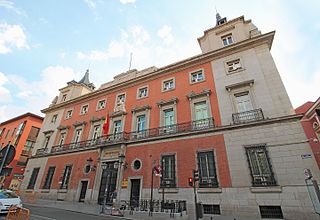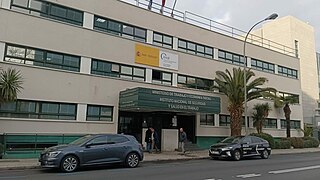
The Ministry of Foreign Affairs, European Union and Cooperation (MAEUEC) is a department of the Government of Spain in charge of planning, managing, carrying out and evaluating the country's foreign and international cooperation for development policies, paying special attention to the ones in relation to the European Union and Ibero-America, as well as coordinating and supervising all actions done in this areas by the other Ministries and Public Administrations. Likewise, it is responsible for promoting international economic, cultural and scientific relationships, taking part in the proposal and application of the migration policy, promoting cross-border and interterritorial cooperation, protecting Spaniards abroad and preparing, negotiating and processing the international treaties which Spain is part of.

The Ministry of Transport, Mobility and Urban Agenda (MITMA), traditionally known as the Ministry of Development (MFOM), is the department of the Government of Spain responsible for preparing and implementing the government policy on land, air and maritime transport infrastructure and the control, planning and regulation of the transport services on this areas. It is also responsible for guaranteeing access to housing; urban, soil and architecture policies; planning and controlling the postal and telegraph services, directing the services related to astronomy, geodesy, geophysics and mapping, and planning and programing the government investments on infrastructure and services related to this scope. The Ministry's headquarters are in the New Ministries government complex.

The Ministry of the Interior (MIR) is a department of the Government of Spain responsible for public security, the protection of the constitutional rights, the command of the law enforcement agencies, national security, immigration affairs, prisons, civil defense and road traffic safety. Through the Undersecretariat of the Interior and its superior body, the Directorate-General for Internal Policy, the Ministry is responsible for all actions related to ensuring political pluralism and the proper functioning of electoral processes.

The Ministry of Justice (MJUS) is the department of the Government of Spain responsible for preparing and carrying out the government policy in order to bring the legal system off, specially in criminal, civil, commercial and procedural law affairs, supporting the Administration of Justice and the legal and international cooperation.

The Ministry of Defence (MINISDEF) is the department of the Government of Spain responsible for planning, developing and carrying out the general guidelines of the Government about the defence policy and the managing of the military administration. It is the administrative and executive body of the Spanish Armed Forces.

The Ministry of the Presidency, Relations with the Cortes and Democratic Memory (MPR) is the department of the Government of Spain which assures the link between the different Ministries and the Prime Minister and is responsible for the relations between the Government and the Parliament. This department also supports The Crown in the exercise of its functions.

The Ministry of Labour and Social Economy (MITES) is the department of the Government of Spain responsible for planning and carrying out the government policy on labour relations and social economy.

The Ministry of Finance or Ministry of Treasury (MH) is the department of the Government of Spain responsible for planning and carrying out the government policy on public finance and budget. It applies and manages the regional and local financing systems and the provision of information on the economic-financial activity of the different Public Administrations.

The Ministry of Education and Vocational Training (MEFP) is the department of the Government of Spain responsible for proposing and carrying out the government policy on education and vocational training, including all the teachings of the education system except university education, without prejudice to the competences of the National Sports Council in matters of sports education. Likewise, it is also the responsibility of this Department the promotion of cooperation actions and, in coordination with the Ministry of Foreign Affairs, the promotion of international relations in the field of non-university education.

The Intelligence Center for Counter-Terrorism and Organized Crime is the Spanish domestic intelligence agency responsible for the prevention of terrorism, organized crime and other violent radical organizations by managing and analyzing all internal information of the country. It was formed in October 2014 by merging of the National Anti-Terrorism Coordination Center and Intelligence Center against Organized Crime.

The Director-General of the Police (DGP) of Spain is a high-ranking official in the Ministry of the Interior. The Director-General is nominated by the Minister of Home Affairs after consulting to the Council of Ministers and he or she is appointed by the Monarch. The director general reports directly to the Secretary of State for Security and has rank of Under Secretary.
The Directorate-General of the Police (DGP) is a component of the Spanish Department of the Interior responsible for exercising the direct command of the National Police Corps, the main civil law enforcement agency of Spain. The DGP, integrated in the Secretariat of State for Security, is in charge of organize, direct, coordinate and execute the missions entrusted to the National Police by the provisions in force, in accordance with the guidelines and orders issued by the Minister of the Interior.
The secretary of state for justice (SEJUS) is the second-in-command to the Spanish minister of justice. The secretary of state is appointed by the monarch at the request of the justice minister and after hearing from the Council of Ministers.

The Secretary of State for Employment and Social Economy is a senior minister of the Ministry of Labour and Social Economy responsible for carrying out the government policy on collective and individual labour relations, working conditions, unemployment benefits, promotion of employment, job training, social economy, and promotion of self-employment. It is also responsible for managing the European Union funds of the European Social Fund.

The Institute for the Elderly and Social Services (IMSERSO) is an agency of the Government of Spain responsible for the management of social services that complement the benefits of the Social Security System, disability and retirement pensions, in its non-contributory modalities, as well as the exercise of the powers of the General State Administration in matters relating the elderly and dependent persons. The IMSERSO is categorized as a "Management Entity of the Social Security".

The Institute of Youth (INJUVE) is an autonomous agency of the Government of Spain responsible for promoting youth associations and collaboration for their advancement; the development and coordination of an information and communication system for youth; the promotion of relations and international cooperation in youth affairs; as well as the cultural promotion of youth and knowledge of other cultural realities.

The Labour and Social Security Inspectorate (ITSS) is a Spanish autonomous agency in charge of the control of the compliance with labour and social security legislation. It also offers technical advice and, where appropriate, conciliation, mediation and arbitration in these matters. The ITSS is, therefore, the apex of the Labour and Social Security Inspection System.

The Secretariat of State for the Civil Service is a component of the Spanish Department of Finance and Civil Service responsible for the government policy on General State Administration's civil servants and other policies regarding civil servants of the regional and local administrations. In the past, it also exercised the powers related to e-administration.
The Directorate-General for Civil Protection and Emergencies (DGPCE) is a component of the Spanish Department of the Interior responsible for promoting, planning and coordinating the various actors involved in the field of civil defence, both national and international.

The National Institute for Safety and Health at Work is an autonomous agency of the Government of Spain. The INSST is considered a technical-scientific agency entrusted with the task of analyze and research on safety and health conditions at work, as well of promoting and supporting the improvement of them, in order to achieve a decrease in occupational hazards, work accidents and occupational diseases.






















